Related Research Articles

Butrint was an ancient Greek polis and later Roman city and the seat of an early Christian bishopric in Epirus.

Vlorë County is one of the 12 counties of the Republic of Albania with the capital in Vlorë. The county spans 2,706 square kilometres (1,045 sq mi) and has a total population of 187,675 people as of 2021. It borders the counties of Fier and Gjirokastër, as well as the Adriatic and Ionian Sea. The neighbouring country of Greece borders Vlorë to the south.

Richard Hodges, is a British archaeologist and past president of The American University of Rome. A former professor and director of the Institute of World Archaeology at the University of East Anglia (1996–2007), Hodges is also the former Williams Director of the University of Pennsylvania Museum of Archaeology and Anthropology in Philadelphia. His published research primarily concerns trade and economics during the early part of the Middle Ages in Europe. His earlier works include Dark Age Economics (1982), Mohammed, Charlemagne and the Origins of Europe (1983) and Light in the Dark Ages: The Rise and Fall of San Vincenzo Al Volturno (1997).

Sir Ivor Anthony Roberts is a retired British diplomat and the former President of Trinity College, Oxford. He was previously British Ambassador to Yugoslavia, Ireland, and Italy. He was knighted in 2000. In addition to his British citizenship, he is now an Irish citizen.

The Kingdom of Albania was established by Charles of Anjou in the Albanian territories he conquered from the Byzantine Empire in 1271, with the help of the local Albanian nobility. The Kingdom of Albania was declared in late February 1272. The kingdom extended from the region of Durazzo south along the coast to Butrint. A major attempt to advance further in direction of Constantinople failed at the Siege of Berat (1280–1281). A Byzantine counteroffensive soon ensued, which drove the Angevins out of the interior by 1281. The Sicilian Vespers further weakened the position of Charles, and the Kingdom was soon reduced by the Byzantines to a small area around Durazzo. The Angevins held out here, however, until 1368, when the city was captured by Karl Thopia. In 1392, Karl Thopia's son surrendered the city to the Republic of Venice.
Robin William Renwick, Baron Renwick of Clifton, is a former diplomat and a former member of the House of Lords. He was appointed by Prime Minister Blair but moved to the crossbenches in 2007. He retired from the House in 2018.

Sir David Norman Reddaway is a retired British diplomat who was High Commissioner to Canada and Ambassador to Ireland and Turkey.
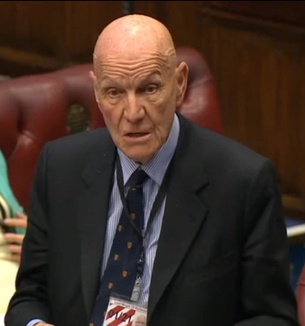
Patrick Richard Henry Wright, Baron Wright of Richmond, was a British diplomat who served as Head of HM Diplomatic Service.
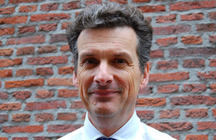
Sir Geoffrey Doyne Adams served as the British Ambassador to Egypt from 2018 to 2021, as a member of the British Diplomatic Service. He was Ambassador to the Netherlands from 2013 to 2017.
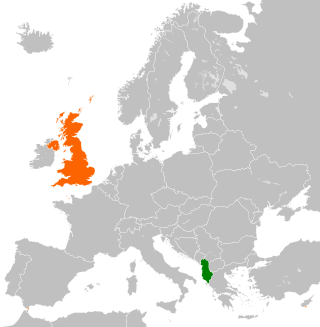
Albania–United Kingdom relations are the bilateral relations between Albania and the United Kingdom. Albania has an embassy in London, and the United Kingdom has an embassy in Tirana.
Christopher William Long was a British diplomat. Following his retirement in 1998, Long served as director of the Oxford University Foreign Service Programme from 1999 to 2003.

Nigel Kim Darroch, Baron Darroch of Kew, is a former British diplomat. He served as the British Ambassador to the United States between January 2016 and December 2019, and previously as National Security Adviser and UK Permanent Representative to the European Union.
The Baiounitai or Vayunites were a Sclavene tribe which settled the region of Macedonia at the end of 6th century. The Baiounitai initially settled in the region west of Thessalonica. They belonged to a group of Slavic tribes that unsuccessfully tried to capture the city at the beginning of the 7th century, after which they are believed to have migrated to the region of northern Epirus, between Ioannina in Greece and Himara in Albania.
Butrint Foundation is an international organization founded in 1993 in the UK by Lord Rothschild and Lord Sainsbury of Preston Candover. The foundation aims to conserve, preserve, and develop the Butrint site in southern Albania. Professor Richard Hodges has been director of archeology. The Packard Humanities Institute provides supports. Patrick Fairweather served as the foundation's first director, and was involved in the Buthrotum Roman archaeological site work from 1997 until 2004.

The architecture of Albania is a reflection of Albania's historical and cultural heritage. The country's architecture was influenced by its location within the Mediterranean Basin and progressed over the course of history as it was once inhabited by numerous civilisations including the Illyrians, Ancient Greeks, Romans, Byzantines, Venetians, Ottomans as well as modern Austro-Hungarians and Italians. In addition, missionaries, invaders, colonisers and traders brought cultural changes that had a large profound effect on building styles as well as techniques.
Sir Patrick Hamilton Moberly was a British diplomat who was British Ambassador to Israel and British Ambassador to South Africa.
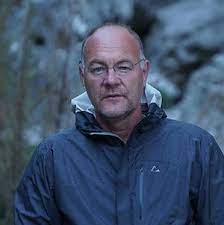
Auron Tare is an American-Albanian historian, journalist and cultural heritage manager. He was a founder of the Albanian National Coastal Agency and its First Director. He was a member of Parliament for Tirana and a member of the Media and Cultural Committee for the Albanian Parliament for the legislation 2009-2013. In May 2018, he was elected chairman of UNESCO Scientific and Technical Committee on Underwater World Heritage. Auron Tare is a well-known public figure in the field of Albanian cultural heritage, government, and journalism and explorations. Championing the cause of cultural preservation, Tare has worked for many years mobilizing support for the preservation of Albania's rich historical background. He is well known for his efforts to protect the ancient city of Butrint in the mid-1990s, when Albania was going through difficult economic and political transitions. He was one of the founders of Butrint National Park and its first director from 1999 to 2005. Auron Tare was for several years the Albanian representative of Butrint Foundation and charity founded by Lord Rothschild and Lord Sainsbury of Preston Candover.
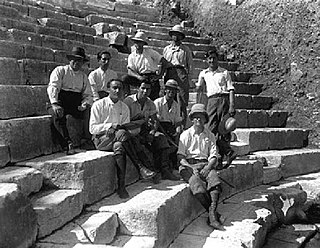
The Archaeological Museum of Butrint was opened in 1938 to highlight the plentiful, and largely Graeco-Roman finds, from the Italian Archaeological Mission of the 1920s and 1930s, led by Luigi Maria Ugolini and was reopened during the 1950s-1960s, in the premises of the Venetian fortress within the acropolis of the ancient city. It contained the plentiful Graeco-Roman archaeological finds from the Italian Archaeological Mission of the period between the two World Wars, that eventually survived the devastation of World War II.
References
- 1 2 3 4 FAIRWEATHER, Sir Patrick (Stanislaus). "Who's Who 2014". A & C Black, an imprint of Bloomsbury Publishing plc, 2014; online edn, Oxford University Press, 2014. Retrieved 23 February 2015.
- ↑ "Lady Fairweather: writer and interpreter". 6 July 2023. ISSN 0140-0460 . Retrieved 7 July 2023.
- ↑ Renwick, Robin (29 January 2015). The End of Apartheid: Diary of a Revolution. Biteback Publishing. p. 7. ISBN 978-1-84954-865-6.
- ↑ "Sir Patrick Fairweather". Au.voyagesofdiscovery.com/. Retrieved 22 February 2015.
- ↑ Pearson, Owen (2006). Albania in the Twentieth Century, A History: Volume III: Albania as Dictatorship and Democracy, 1945–99. I.B.Tauris. p. 654. ISBN 978-1-84511-105-2.
- 1 2 Hodges, Richard; Bowden, William; Lako, Kosta; R. D. Andrews (2004). Byzantine Butrint: Excavations and Surveys 1994–1999. Oxbow Books for the Butrint Foundation. p. 18. ISBN 978-1-84217-158-5.
- ↑ Hodges, Richard (2008). Rise and Fall of Byzantine Butrint. Butrint Foundation. p. 5. ISBN 978-0-9535556-7-3.
- ↑ "Butrint preserved". The Economist. 16 August 2001. Retrieved 22 February 2015.
- ↑ Esterhuyse, Willie (17 May 2012). Endgame: Secret Talks and the End of Apartheid. Tafelberg. p. 140. ISBN 978-0-624-05812-0.